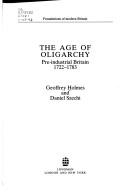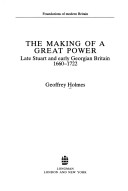Foundations of Modern Britain
2 total works
"Foundations of Modern Britain", presents a history of "Britain" from the point at which she first became a recognisable entity down to modern times, and traces the earlier foundations of the British state in the development of England from the late 14th to the early 18th century. A general history of mid-Georgian Britain, exploring all aspects of domestic and foreign affairs on the threshold of the Industrial Revolution. It shows how the newly-united and politically-stable nation exploited its expanding wealth, its hard-won social cohesion at home, and its increasing influence abroad. It traces Britain's rise to imperial greatness and examines the repercussions of the spectacular disaster - the loss of the American colonies - with which the book closes. It deals with social, economic, religious, cultural and intellectual history, as well as politics. It is the independent and self-sufficient sequel to Geoffrey Holmes's The Making of a Great Power: Later Stuart and Early Georgian Britain 1660-1772 (published simultaneously). Together they fill the last remaining gap in this key series.
The eighteenth century has become one of the most active areas of current historical research: this book takes into account the findings of the new revisionist historiography while retaining what still seems valid from the old. It has a student-friendly presentation with good reference apparatus: covers every aspect of the period in 22 essay-focused chapters, with full chronological "frameworks of events", a compendium of factual information at the end, and extensive bibliographies. A book for fellow accademics as well as the student and general reader.
The eighteenth century has become one of the most active areas of current historical research: this book takes into account the findings of the new revisionist historiography while retaining what still seems valid from the old. It has a student-friendly presentation with good reference apparatus: covers every aspect of the period in 22 essay-focused chapters, with full chronological "frameworks of events", a compendium of factual information at the end, and extensive bibliographies. A book for fellow accademics as well as the student and general reader.
Distinctive in design and distinguished in execution, Foundations of Modern Britain presents a history of 'Britain' from the point at which she first became a recognisable entity down to modern times, and traces the earlier foundations of the British state in the development of England from the late 14th to the early 18th century. The Britain of the 1720s - constitutionally united, tempered by a generation of warfare with France, and newly established as a major European power - offers an astonishing contrast with the England of the 1660 Restoration, shakily emerging from the upheavals of the civil wars and interregnum. How that transformation came about is the subject of this book. Covering social, economic, religious cultural and intellectual history as well as politics, it presents an incomparably rich portrait of the late Stuart and early Georgian nation. Together with its independent and self-sufficient sequel, The Age of Oligarchy: Pre-Industrial Britain 1722-1783 (by Geoffrey Holmes and Daniel Szechi - being published simultaneously), it fills the last remaining gap in this key series.
The 17th century remains the most intensively studied period on British history courses: the preceding volume in the series, Alan Smith's The Emergence of a Nation State: the Commonwealth of England 1529-1660 is the best-seller in a strong-selling series, and Barry Coward's The Stuart Age 1603-1714 is our best-selling British history text of all. Elaborate student-friendly presentation with an impressive reference apparatus: covers every aspect of the age in 25 essay-focused chapters, with full chronological "frameworks of events", and exhaustive Compendium of factual information at the end, and extensive bibliographies.
The 17th century remains the most intensively studied period on British history courses: the preceding volume in the series, Alan Smith's The Emergence of a Nation State: the Commonwealth of England 1529-1660 is the best-seller in a strong-selling series, and Barry Coward's The Stuart Age 1603-1714 is our best-selling British history text of all. Elaborate student-friendly presentation with an impressive reference apparatus: covers every aspect of the age in 25 essay-focused chapters, with full chronological "frameworks of events", and exhaustive Compendium of factual information at the end, and extensive bibliographies.

